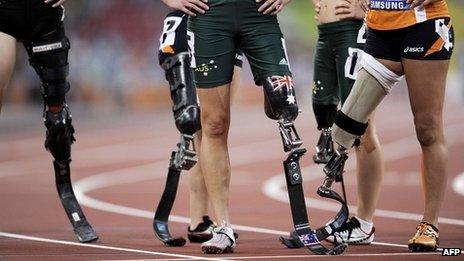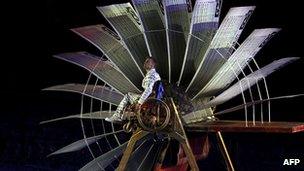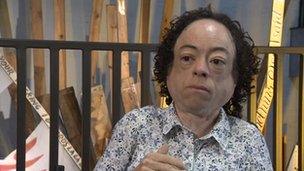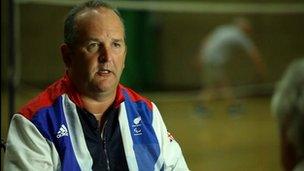Disabled people divided over Paralympics effect
- Published

Critics describe the athletes and how they are viewed as 'inspirational porn'
The opening ceremony for the 13th Paralympic Games has successfully re-kindled the country's sense of euphoria kicked off by the Olympics.
The message from the opening was clear, from the call for intellectual curiosity from Professor Steven Hawking, to the high wire arrival in the stadium of a double-amputee serviceman, topped off by the lighting of the cauldron by the winner of Britain's first Paralympic gold medal over 50 years ago - disabled people excel in many areas, and not just sport.

The opening ceremony sent a clear message that disabled people excel in many fields
But as we settle down for 10 days of athletic excellence, and the word "inspiration" hangs heavy in the air, there is a darker side to disability in Britain, and some people are asking how this can be reconciled with the feel good factor of the Paralympics.
It has been captured in a recent report by the disability campaigning charity Scope, which says that almost half of the disabled people they surveyed feel that attitudes to them over the past year have worsened noticeably.
They cite government plans to cut welfare benefits, and the media coverage accompanying it which often allies "disabled" to "benefit scrounger".
They point to rises in what is being described as "hate crime", involving verbal and physical abuse, and a general sense that as people as a whole struggle in the current economic situation, empathy with disability is on the decline.
But an overwhelming majority of the people questioned also thought that greater visibility of disabled people, in everyday life, and particularly on the media, could have a very positive effect in reversing this trend.
And Scope themselves have identified the Paralympics as just the kind of event which could achieve this.
Scope's chair, Alice Maynard, believes it is not just the deeds of the sportsmen and women which can change perception, but the disabled pundits that television and radio have assembled for their hundreds of hours of proposed coverage:
"They'll be seen as authority figures; the ones doing the explaining, teasing out the technicalities," she told me. "It is not a role in which we're used to seeing disabled people."
But changing centuries of prejudice and misunderstanding about disability is a heavy burden to place on a group of athletes who, let us face it, are doing this because, just like their Olympic counterparts, they love sport.
Stereotypes
The doubters include people like disabled actor and stand-up comedian Liz Carr, who has nothing against paralympians, but is cringing at what she thinks will be 10 days of what she, and others, call "inspirational porn".

Comedian and actress Liz Carr is concerned the Paralympics could divide disabled people
"What we mean by this is the way in which the athletes are going to be seen not as whole people, but as supermen and women, only reflected through the prism of this one aspect of their lives," she explained.
The "Supercrip" she argues, is just one more disability stereotype, which is no more real than the image of the victim, or the scrounger.
She even wonders whether the orgy of admiration could do more harm than good, dividing disabled people in the public mind between "those wonderful athletes", and those who have fallen short of the paralympian ideal.
Baroness Tanni Grey-Thompson, certainly would not go that far, but the winner of 11 Paralympic gold medals as one of the world's most successful wheelchair racers, has a surprising amount of sympathy for the view:
"The Paralympics is the fairy-dust we sprinkle on life as a disabled person; it shows a snapshot in time of some extraordinary people who train very hard, who are good at sport," she said. "It is great while it lasts, but probably not going to change the world, and certainly not on its own."
Media spotlight
Baroness Grey-Thompson would be the first to admit that while she can leave people far behind as she powers down the track, she still cannot get down an escalator to board an inaccessible tube train, and still needs the public's help to do what they regard as very ordinary things.
But a gradualist at heart, she does believe the Paralympics can play a part in weaning the public off the idea of disabled people as victims.

Boccia gold medallist Nigel Murray thinks the media coverage will make London a game changer
"If there is one thing the Paralympics can do it is opening people's minds to think 'actually hang on, we used to have this dreadful view of disabled people; they're work shy; they're benefits scroungers, but now we're a little bit more open'," she said.
My own experience of covering the previous four Paralympics is that interest in the games, and the personalities who emerge from them, tends to start slowly, but gradually grow to a crescendo as the event goes on.
But my experience also tells me that memory of what was learned soon fades when the Games are over.
Paralympians like Nigel Murray, who is a gold medal winner at Boccia, a form of bowls developed as a sport for more severely disabled people, believes that because the Games are in London, this time it will be different,
"In previous years gone by I think that Paralympics have come and gone and once the media attention has gone away that's it for people," he said. "But the fact that it is in London and we are the host means that there is going to be unprecedented coverage."
Many agree with him. But as one sceptic put it to me:
"It is great to hold a party, perhaps particularly when times are tough. It gives you a lift. But when you wake up the next morning, the problems are still there; you have a hangover; and you have to pay the bill."
- Published28 August 2012